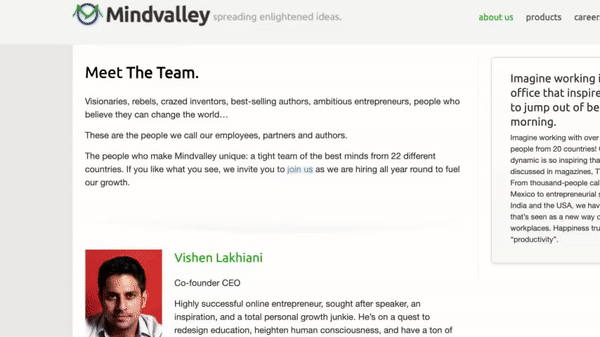What’s silent and completely invisible, but when it shows up at your door can evoke insane self-doubt, anxiety, and fear? I’ll give you a hint…
It’s something that 82% of the population will experience at some point in their life…
And it affects women at an alarmingly higher rate than men. But you gentlemen are no stranger to it either.
It not only fills you with dread, but feelings of inadequacy, low self-esteem, and skepticism about your talents, skills, and capabilities…
And if it goes unchecked, it may even lead you to sabotaging your own hard work and career…
Ding ding ding. Yes, I am talking about Imposter Syndrome!
Imposter Syndrome seems to be a pretty big “buzzword” these days. Everyone has likely heard someone talking about it. But no one is REALLY talking about it… I mean what is Imposter Syndrome anyway?
When does it pop up? How can you recognize it? And more importantly, how can you overcome it?
Well, that’s exactly what I’m talking about in today’s blog.
So get cozy and pay attention because I’m going to spill all the tea on my own personal experience with Imposter Syndrome and how I’ve continually pushed past it, again and again, to get to where I am today.
Hey guys, what’s up?! It’s Alex.
Today’s blog was highly – and I mean HIGHLY – requested by my global Posse. If you’re already part of the crew leave a comment to let me know you’re here.
And if you’re new to my website welcome! Here you’ll find tons of practical tutorials on copywriting, marketing, and freelancing, as well as a few mindset gems like this one designed to hopefully inspire and motivate you in your business or career.
So go ahead and join my email list so that you never miss another piece of advice from me.
Alright now...
What is Imposter Syndrome?
Well, it was first described like this by two psychologists in the 1970s…
“Impostor phenomenon occurs among high achievers who are unable to internalize and accept their success. They often attribute their accomplishments to luck rather than to ability, and fear that others will eventually unmask them as a fraud”.
And even though Imposter Syndrome isn’t technically recognized as an official diagnosis, most people (including psychologists) acknowledge that it is very real and super common today.
In fact, did you know that there are actually 5 different types of Imposter Syndrome? That’s right, not everyone experiences this phenomenon the same way…
But before I get to that, I want to make sure you guys REALLY understand something that I FIRMLY believe…
Imposter Syndrome can be a GOOD THING.
I know, I know… cue the controversy. But hear me out.
Remember a few years ago when a lot of people were saying the secret to success was to just not give a fuck?
That if you want to succeed in life, then you need to stop caring so much about what other people think.
Now, don’t get me wrong. I can appreciate the core message those people were trying to send… because at the end of the day, you do gotta get out of your own way.
But at the same time, I think that they really messed with all of us who do REALLY care, like a lot. As if caring is a weakness and therefore, something must be wrong with us!
But you guys, I’ve literally built my entire brand and business around giving a fuck (actually probably too many of them).
The truth is, caring about others is amazing. It’s how you build trust and credibility. It’s how people relate to you. It’s how you show up as authentic and relatable. So really, I think we all need to give CARE MORE. Especially with the state of the world right now.
The way I see it, when you experience Imposter Syndrome it means you’re ACUTELY aware of how you’re showing up and how others might perceive you… which means you care.
And the more you care, the more empathy you have. Which ultimately will bring you more success in every area of your life.
But where Imposter Syndrome becomes really DANGEROUS is when you let it completely stop you from taking action…
And this can happen in a lot of sneaky ways.
In fact, Dr. Valerie Young, author of The Secret Thoughts of Successful Women, has broken down Imposter Syndrome into 5 different types…
And understanding your “type” is actually pretty important because each has slightly different habits or patterns that can keep you stuck, which means that each type also has specific things you can do to get yourself UNstuck.
Learning this was a total game-changer for me because I am guilty of so many of these habits that I never realized were actually Imposter Syndrome showing up in disguise.
I used to think Imposter Syndrome was simply feeling inadequate, but it’s so so so much more than that.
So at the end of this article, I’m going to break down the 5 types of Imposter Syndrome and share a specific action step you can take to kick it to the curb… so make sure to stick around for that.
But first, I want to share my personal experience of Imposter Syndrome with you, because no matter how many times you hear “it’s normal” it can still feel like an unstoppable monster until someone shares their own journey that you can relate to. So here we go…
IMPOSTER SYNDROME LEVEL 1: I’M NOT SMART ENOUGH
Imposter Syndrome first reared its ugly head in my life when I decided I didn’t want to go to law school. I had just graduated from University and had an overwhelming gut-feeling that maybe being a lawyer wasn’t what I wanted.
I had no freaking idea what I wanted to do, but I needed money. So there I was, moving back into my parent’s basement and waiting tables in my hometown (with a full-blown Business Degree, might I add)…
I knew I wanted to travel but had zero money saved up so I started looking for jobs overseas.
And that’s when I found Mindvalley… And I’ll never forget looking at their website reading…
And I quote – “If you are a god-gifted genius we will give you everything you need to realize your potential.”…

(Thank you WayBackMachine.Org for proving that my memory was in fact correct)…
And I remember thinking WOW I’m definitely not getting a job there. I looked at the people who worked there – insanely smart developers and marketers and writers – and I thought… me? A genius? Not even a little bit… I’m not smart enough to work here.
But you can probably guess what I did.
I said “eh, what do I have to lose?” So I applied anyway… And guess what? I GOT THE FREAKIN’ JOB.
Imagine if I had let my Imposter Syndrome stop me from applying? But then what happened next?
IMPOSTER SYNDROME LEVEL 2: I DON’T BELONG HERE
Well, fast-forward a few months and I actually started working at Mindvalley, and let me tell you… HELLO Imposter Syndrome McGee!
I started at the bottom as an intern answering customer support emails and every single day I was surrounded with ACTUAL geniuses… I’m talking about people straight outta Silicon Valley and big tech companies. So just being in the same room as these insanely smart people gave me major Imposter Syndrome (even if I was just the customer support girl).
But, as a small startup company that was growing FAST, there were a lot of opportunities to learn and grow and take on more responsibilities…
So I started to step in and support where I could – in project management, content and copywriting, paid media buying and launches…
There was that Imposter Syndrome again – I mean who was I to think I could do all that? I knew NOTHING about marketing at the time…
And not only was I battling serious feelings of inadequacy, but I was ALSO the youngest person at the company at the time. So, of course, I had Imposter Syndrome about my age too…
I’d go to a lot of mostly male-dominated conferences and everyone that met me was constantly saying things like “oh my gosh, look at you!!! You’re so young!”
Which of course, just fueled the fire of “What are you doing? You don’t belong here. No one takes you seriously”…
At the time, I acted over-confident, to hide my deep insecurities. But I just kept moving forward…
3 years later, I was the Event Director of what’s now Mindvalley’s largest personal development event, AFest, and the Creator Director of the then 12 million dollar company… all by the age of 25.
Look, there I am! Thanks again to WayBackMachine.org…

Yeah, not so bad right? I would say that at that time I felt like I had successfully “beat” Imposter Syndrome and was feeling pretty dang confident. BUT then, I quit my job and moved back to Canada.
IMPOSTER SYNDROME LEVEL 3: I’LL NEVER MEASURE UP
I went from living the dream as a top marketing executive for Mindvalley to sleeping on an air mattress back in Canada to start my freelancing career.
I had no clients, no income, and no idea how to start a business. I was living in the spare room of a friend’s apartment and paying a super discounted rent because her dad was the landlord (thank God).
I literally had to start from scratch, and let me tell you, the Imposter Syndrome was HUGE.
While I had learned copywriting from many of the “legends” of the marketing world, I never had been paid to actually write copy before as it was never my official title at Mindvalley. So naturally, I thought, who am I to call myself a copywriter?! I don’t measure up to these guys…
And I told myself that for YEARS!
I would take on clients as a marketing consultant, but when it came to copywriting I CONSTANTLY downplayed my skills, saying that I could “sort of” do it if they really needed it…
Basically, I played super-small in the beginning of my business, because I was scared that one of the “greats” I learned from, would find out what I was doing and call me out as a fraud.
Despite the feedback I’d get from my clients saying my work was amazing. Despite the multi-million dollar launches I was executing. Despite the fact that I was making multiple 6-figures a year as a freelance copywriter, I STILL kept it a secret because I didn’t want people to look at me and go “YOU’RE NOT A REAL COPYWRITER”.
It took me a long time to own that title. And then…
IMPOSTER SYNDROME LEVEL 4: AM I A JOKE?
Then in 2019 when I decided to start my YouTube channel, I had to own it in a whole other way… by stepping out from behind-the-scenes for people – the entire Internet – to see and possibly judge.
And yep, allllllll those impostery feels (that I just worked years to overcome), came back—in full force!
My fear was (once again) that the people who I learned from, looked up to, and considered to be the best copywriters in the industry would see my videos and think I’m a joke… But I pushed myself out of my comfort zone and did it anyway.
And P.S. now I have some of those same copywriters messaging ME asking me for strategy tips and advice. True story. Now that’s massive validation if you ask me…
But did Imposter Syndrome stop there? Hell no.
IMPOSTER SYNDROME LEVEL 5: I AM NOT WORTHY
A year after starting my channel, I decided to launch my first copywriting program and, of course, Imposter Syndrome came up again… Like “whoa, whoa, whoa. Sure I can do this and talk about it on YouTube. But I can’t actually CHARGE people for this education. I am not worthy of making money from teaching this.”
I really thought that people would see me as underqualified or “not good enough” to be their teacher. It was terrifying. BUT I DID IT ANYWAY. And now, I’ve helped thousands of people, through my coaching programs and YouTube videos.
All because I kept showing up. I felt the fear and did it anyway. I cared what people thought and I did it anyway. Even when I felt like a fraud. Even when my ego took a hit…
And I honestly think that’s the biggest lesson that ANYONE can take from this entire article is this…
CARE A LOT AND JUST DO IT ANYWAY. Okay?!
Because Imposter Syndrome will never go away completely. It may decrease as your confidence and skills grow, but then you try something different or do something new and BAM! There’s Imposter Syndrome Level 6 or 19, or 100. Or whatever that looks like for you.
One of my Launch Pad grads once said “Don’t be the one to tell yourself no”… and there’s so much truth in that. Remember that you’ll never know what could have happened if you never try.
In my opinion, the best thing you can do is start recognizing Imposter Syndrome. That way, when it shows up, you can say “oh hey imposter syndrome, I see you there!” and then just keep doing your thang.
Because I really believe that if you fail to recognize it, you might fall victim to the doubt and fear that it will stir up and quit something that could turn out to be your biggest success in life. Or worse, not try it at all.
So with that, let’s talk about the 5 types of Imposter Syndrome identified by Dr. Valerie Young, along with an action step you can take to overcome it.
#1 – The Perfectionist
I mean if you think about it… perfectionism and Imposter Syndrome really do go hand-in-hand. Perfectionists will often set extraordinarily high goals, standards, and expectations for themselves… and then when they fail to reach those goals or expectations, they experience major self-doubt and feel like they might actually be a total fraud.
ACTION STEP: First and foremost, accept that it’s literally impossible to be perfect all of the time. There will always be something you “could have done better”.
So try to give yourself more grace there and start celebrating your “small” wins along the way. Oftentimes you can be so focused on the ONE big goal, that you’re never satisfied (even if you’ve been doing some pretty amazing things along the way)
#2 – The Superhuman
This group is filled with so much self-doubt and believes so strongly that they’re phonies, that they’ll push themselves to work EVEN HARDER than everyone else so that they can “measure up” and avoid being exposed as a fraud. This type of “workaholism” can lead to serious burnout, mental fatigue, and it could even sabotage your relationships.
ACTION STEP: Stop comparing yourself to others. We’re all guilty of it, but when your sense of validation comes directly from how you think you measure up to others… you will never, ever, ever feel “good enough”.
You need to learn to be confident in your abilities and where you are RIGHT NOW. There’s absolutely no one out there who is expecting a newbie to have the same skill level as a seasoned pro, so let off the gas a little and let yourself grow without the insane, and unrealistic, pressure.
#3 – The Natural Genius
These types of imposters set their internal bar ridiculously high, just like perfectionists. But natural genius types don’t just judge themselves based on ridiculous expectations, they also judge themselves based on getting things right on the first try. If they can’t master something immediately, with ease and grace, that’s when they start to feel like an imposter.
ACTION STEP: One of the biggest faults of this type is not trying something new, out of fear of failing or getting it wrong. So the best thing you can do to overcome it… is YEP—do it anyway.
And just own the fact that you probably WON’T be a natural the first time, or maybe even the first dozen times. Which is okay because no one else is either. Stop playing small out of fear of striking out. You won’t hit any home runs that way.
#4 – The Soloist
If you believe that asking for help means that you’re a fraud, or phony, who actually has no clue what they’re doing… then you’re probably a Soloist. Soloists are independent to a fault. They will refuse help from others (even when they need it) in fear of being thought of as incompetent.
ACTION STEP: Practice asking for help! You may need to pep talk yourself a little at first, and that’s okay. Just remember that there’s no shame in asking for help. Trust me, it’s better to ask for help, then stumble along and try to figure it out for yourself.
#5 – The Expert
This type usually measures their competence based on “how much” they know. Typically, they put off starting ANYTHING until they “know all there is to know,” out of fear of being exposed as inexperienced or unknowledgeable.
ACTION STEP: To combat this you should first and foremost stop trying to learn ALL THE THINGS, simply for the sake of “hoarding” knowledge for comfort. Try learning new skills and then putting what you learn into practice! Because at the end of the day, you can only really learn through doing, anyway.
So which Imposter Syndrome personality do you identify with? Drop a comment below!
Until next time, I’m Alex and I believe in you! Ciao for now!


